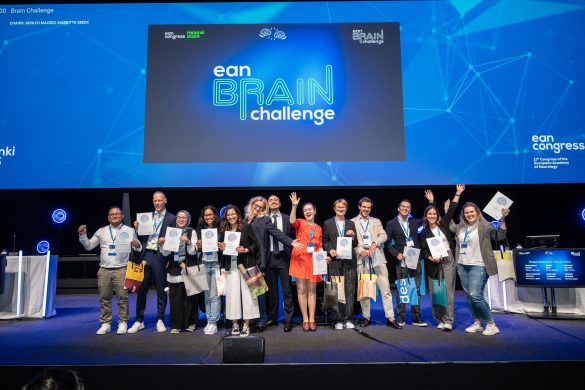by Isabella Colonna
For July we have selected Kuramatsu JB, Gerner ST, Ziai WC, Bardutzky J, Sembill JA, Sprügel MI, Mrochen A, Kölbl K, Ram M, Avadhani R, Falcone GJ, Selim MH, Lioutas VA, Endres M, Zweynert S, Vajkoczy P, Ringleb PA, Purrucker JC, Volkmann J, Neugebauer H, Erbguth FJ, Schellinger PD, Knappe UJ, Fink GR, Dohmen C, Minnerup J, Reichmann H, Schneider H, Röther J, Reimann G, Schwarz M, Bazner H, Classen J, Michalski D, Witte OW, Günther A, Hamann GF, Lücking H, Doerfler A, Ishfaq MF, Chang JJ, Testai FD, Woo D, Alexandrov AV, Staykov D, Goyal N, Tsivgoulis G, Sheth KN, Awad IA, Schwab S, Hanley DF, Huttner HB. Association of intraventricular fibrinolysis with clinical outcomes in ICH: an individual participant data meta-analysis. Stroke. 2022 May 6. doi: 10.1161/STROKEAHA.121.038455. Epub ahead of print. PMID: 35521958.
Our research paper of the month is a meta-analysis which aims to investigate the influence of intraventricular fibrinolysis (IVF) on functional outcomes in patients with intracerebral haemorrhage (ICH). It has been shown that IVF may determine the resolution of ventricular clot, resulting in decreased mortality; however, it is not clear whether IVF may contribute to improving the functional status of ICH patients.
This meta-analysis included 1501 patients from two randomised trials and seven observational studies conducted from 2004 to 2015. The authors compared IVF versus standard of care in a ICH population treated with external ventricular drainage (EVD) because of acute hydrocephalus due to intraventricular haemorrhage. The IVF was performed by administering alteplase through an EVD until the stopping point was reached. The stopping point was considered as radiographic opening of the third and fourth ventricles, and/or reduced mass effect of intraventricular haemorrhage, or reached maximum dose according to the individual study protocols. Functional disability at six months, evaluated by the modified Rankin Scale (mRS), was considered as primary outcome. Secondary outcomes were ordinal-shift analysis of the mRS at six months, all-cause mortality at six months and intracranial adverse events occurring within 30 days.
The results of this paper showed that the absolute treatment effect of IVF to reach a favorable functional outcome (mRS score 0-3) at six months was 9.3 % (95%CI: 4.4-14.1, p<0.001) and was even greater (15.2%, 95% CI: 8.6-21.8, p<0.001) if IVF treatment was performed within 48 hours after symptom onset. Moreover, the treatment with IVF was associated with a significant shift towards improved functional outcome across the entire range of mRS (OR 1.75, 95%CI: 1.39 – 2.17, p<0.001) and with reduced mortality (OR:0.47, 95%CI: 0.35-0.64, p<0.001). Regarding safety, the frequency of adverse events and new intracranial haemorrhagic complications did not differ significantly between the two groups.
In conclusion, this work showed that treatment with IVF in patients with acute hydrocephalus due to intracerebral/intraventricular haemorrhage related to improved functional outcome at six months; this association was greater for patients receiving IVF in an early time window (<48 hours). The results of this meta-analysis may help to define a target population for future trials.













